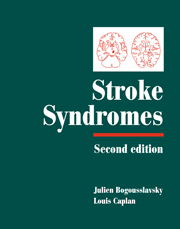Book contents
- Frontmatter
- Contents
- List of contributors
- Preface
- PART I CLINICAL MANIFESTATIONS
- 1 Stroke onset and courses
- 2 Clinical types of transient ischemic attacks
- 3 Hemiparesis and other types of motor weakness
- 4 Sensory abnormality
- 5 Cerebellar ataxia
- 6 Headache: stroke symptoms and signs
- 7 Eye movement abnormalities
- 8 Cerebral visual dysfunction
- 9 Visual symptoms (eye)
- 10 Vestibular syndromes and vertigo
- 11 Auditory disorders in stroke
- 12 Abnormal movements
- 13 Seizures and stroke
- 14 Disturbances of consciousness and sleep–wake functions
- 15 Aphasia and stroke
- 16 Agitation and delirium
- 17 Frontal lobe stroke syndromes
- 18 Memory loss
- 19 Neurobehavioural aspects of deep hemisphere stroke
- 20 Right hemisphere syndromes
- 21 Poststroke dementia
- 22 Disorders of mood behaviour
- 23 Agnosias, apraxias and callosal disconnection syndromes
- 24 Muscle, peripheral nerve and autonomic changes
- 25 Dysarthria
- 26 Dysphagia and aspiration syndromes
- 27 Respiratory dysfunction
- 28 Clinical aspects and correlates of stroke recovery
- PART II VASCULAR TOPOGRAPHIC SYNDROMES
- Index
- Plate section
18 - Memory loss
from PART I - CLINICAL MANIFESTATIONS
Published online by Cambridge University Press: 17 May 2010
- Frontmatter
- Contents
- List of contributors
- Preface
- PART I CLINICAL MANIFESTATIONS
- 1 Stroke onset and courses
- 2 Clinical types of transient ischemic attacks
- 3 Hemiparesis and other types of motor weakness
- 4 Sensory abnormality
- 5 Cerebellar ataxia
- 6 Headache: stroke symptoms and signs
- 7 Eye movement abnormalities
- 8 Cerebral visual dysfunction
- 9 Visual symptoms (eye)
- 10 Vestibular syndromes and vertigo
- 11 Auditory disorders in stroke
- 12 Abnormal movements
- 13 Seizures and stroke
- 14 Disturbances of consciousness and sleep–wake functions
- 15 Aphasia and stroke
- 16 Agitation and delirium
- 17 Frontal lobe stroke syndromes
- 18 Memory loss
- 19 Neurobehavioural aspects of deep hemisphere stroke
- 20 Right hemisphere syndromes
- 21 Poststroke dementia
- 22 Disorders of mood behaviour
- 23 Agnosias, apraxias and callosal disconnection syndromes
- 24 Muscle, peripheral nerve and autonomic changes
- 25 Dysarthria
- 26 Dysphagia and aspiration syndromes
- 27 Respiratory dysfunction
- 28 Clinical aspects and correlates of stroke recovery
- PART II VASCULAR TOPOGRAPHIC SYNDROMES
- Index
- Plate section
Summary
Classification of memory
Memory is the persistence of information in the central nervous system. It is not a unitary function, it comprises independent systems and processes that can dissociate from each other (Tulving, 1991).
Three major cognitive processes are involved in memory: registration (or encoding, during which information is translated into a code to be stored), retention (or storage) and retrieval (when the information is searched and recalled). Memory can be impaired at any of these three steps, but it may be difficult to differentiate between them.
A registration disorder should produce mainly an anterograde amnesia, since facts already stored should not be so much affected. However, it may also include a limited period of retrograde amnesia, involving recent memories still undergoing a process of consolidation (Squire et al., 1992). A retrieval or a storage impairment, on the contrary, will produce both a retrograde, and an anterograde, amnesia. While a storage disorder is irreversible, a retrieval impairment may recover and is identified by an improved performance in memory tests with cueing recall (vs. free recall) and in recognition tasks (when compared to recall tasks) (Ellis & Young, 1997).
According to Tulving (1995), memory systems may be divided into five main categories: semantic, episodic, primary, procedural and perceptual representation systems. A major distinction is made between declarative (or explicit) and procedural (or implicit, non-declarative) memory (Table 18.1).
Declarative memory is the type of memory one is aware of. It is directly acessible to conscious recollection and may be subdivided into semantic memory (our general knowledge of facts, concepts, and meanings) and episodic memory (consisting mainly in autobiographic events framed by a specific spatio-temporal context).
- Type
- Chapter
- Information
- Stroke Syndromes , pp. 242 - 251Publisher: Cambridge University PressPrint publication year: 2001
- 1
- Cited by



